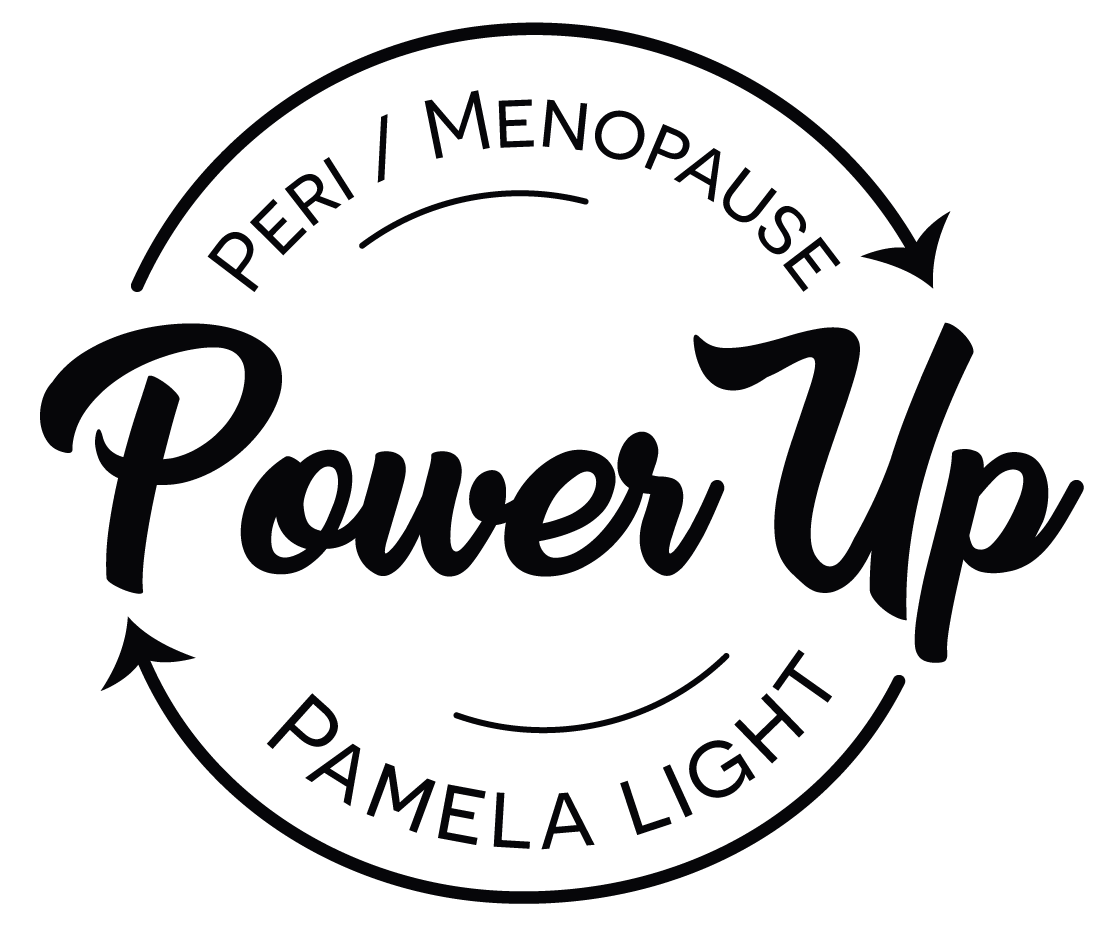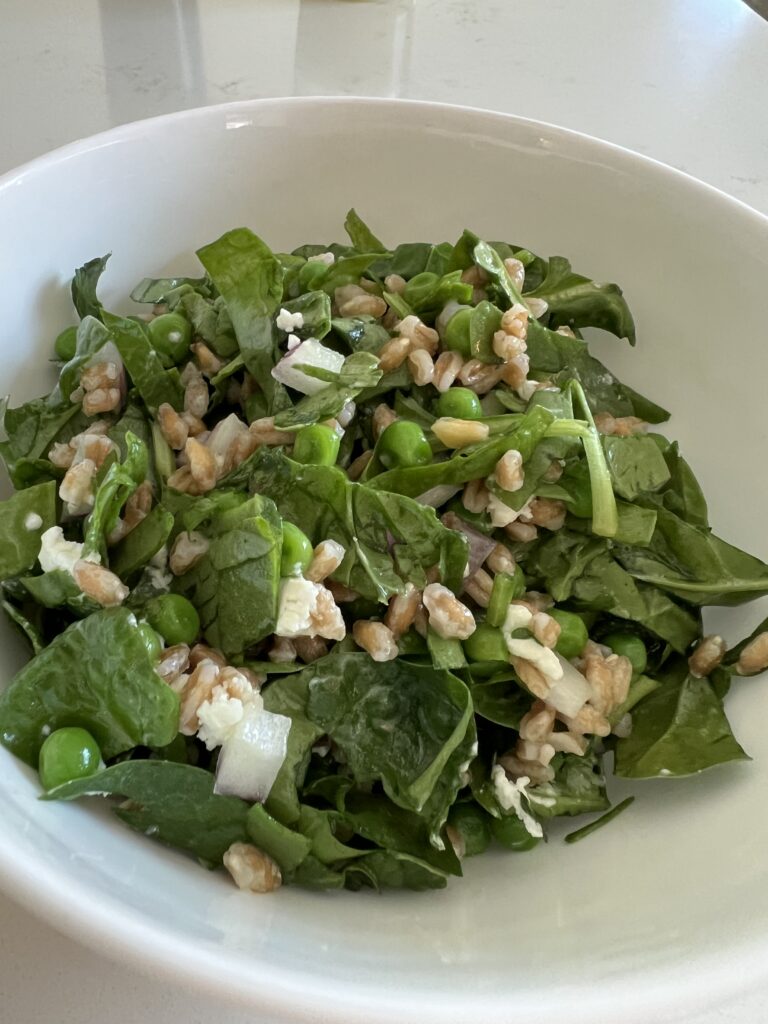When I say the word carb, what pops into your mind? Was it a bagel? Pasta? I guarantee it is different for every person who is reading here. Thanks to health media, regardless of what you pictured, carbs are now served up as something to fear with a side of confusion. To cut the carb confusion, check out this guide to Carbohydrates and Perimenopause.
What is a Carb?
Everything we eat can be divided into one of four groups:
Carbohydrates
Proteins
Fats
Fiber
That means SO MANY things we eat will fall into the category of carbohydrates. Good things like fruit, veggies, beans and whole grains are carbs.
Carbohydrates have become the villain because there are so many unhealthful, hyper-processed foods available to us. These processed versions are typically made up of very refined versions of carbohydrates and then loaded with sugar. The wheats, soys, rices, oats and other usually healthful carbohydrates in these foods have been drastically changed.
They enter our blood stream quickly and will be stored quickly. Foods closest to their natural state are more complex and slow to break down. They enter the blood slowly and provide energy over time.
In peri/menopause our hormones struggle with processed and refined foods, making them more likely than ever to be stored, especially as fat in the belly. Eating foods closer to their natural state is more important than ever.
We need carbohydrates to provide the energy to keep moving, make our brain function, keep our hearts pumping and allow our bodies to produce the hormones needed to function.
Carb Q & A:
Q: Are food like beans a carb or a protein?
A: Many foods will contain both fat and carbohydrate or carbohydrate and protein, sometimes all three. To keep it simple, if there are more carbohydrates than fats or protein, the food is categorized as a carb. This information can usually be found on the nutrition label or quickly searched on the internet.
Q: Are fruits a carb? And should I eat them?
A: Yes and yes. Whole fruits are packed with fiber, vitamins and minerals. Fruit juices, wine, or high fructose concentrations in processed foods have no fiber and will be stored in your body like refined sugar. In peri/menopause, it is best to consume fruit earlier in the day and stick to lower sugar fruits like berries.
Q: Are vegetables carbs? And should I eat them?
A: Yes. And Yes. Veggies are packed with nutrients and fiber. It is safe to place vegetable in an entirely different category than carbohydrates and eat as many of them as possible. Some veggies are more starchy than others, like squash and carrots. Do not fear these things! It is very hard to overeat these items. If you sat down to eat a pile of carrots, not only would you become exhausted of chewing, but not all of the calories you swallowed would be absorbed by the body. If you sat down to the equivalent pile of crackers or tortilla chips, you could easily eat them all and they would all be broken down and stored by the body.
Q: What is one serving of carbohydrates?
A: Easiest method: One serving is the amount that would fit in a cupped hand. For the math people: If you look on a package: 15g (of carbohydrates) is one serving. For the cooks: 1/2 C, approx.
Most restaurants will give you 4 servings of carbohydrates and less than one serving of protein. Shoot for a plate that has one to two servings of protein, one cupped hand of the best carbohydrates, tons of veggies, and about one thumb-sized serving of fat.
Q: To potato or not to potato?
A: Potatoes in their natural form are A-ok. They run into trouble when they are fried, loaded with butter, or processed – which is how they are usually found. The potato that has become a chip or a French fry is nothing like the one you bake or roast at home. If you can keep it natural, the resistant starch in potato is fantastic for the gut. Sweet potato is absorbed more slowly than white potato. Using one cupped handful of potato as a serving of carbs paired with lean protein and tons of veggies is the best way to enjoy a potato.
Peri/menopause Carb guidelines
- Eat more carbohydrates earlier in the day, focus on protein and veggies at night.
- Keep to the BEST, least processed version of carbohydrates.
- Stick to one cupped palm of the best carbohydrates as a serving size.
- Eat those best carbohydrates paired with fats or proteins to slow absorption even more.
- Eat one serving of the best carbohydrates before a workout to help release fat for fuel as you exercise.
What are the BEST whole food carbohydrates?
Quinoa
Potato
Beans
Lentils
Brown Rice
Oats
Farro
Our bodies change drastically during peri / menopause. Carbohydrates that used to be just fine might be causing bloating, gas, constipation, or inflammation now sure to your changing hormones.
The Powerup and Reset online coaching course is designed for the Peri / menopause women, so she can discover the foods that work best right now and learn how to fold these foods into her life effectively to insure her best long-term health. Take a look at the online Coaching course: Powerup and Reset if you are ready to make a change.
Check out these articles for more info on how certain carbohydrates may be affecting your body:
Your Body is not Broken….It Might be Sugar…..Or Alcohol
Gaining Fat? What Your Peri/menopausal Body is Telling You
Find Recipes loaded with the Best Carb options HERE
If you are over being frustrated by your body, are tired of being tired, and feel like everything you do makes things worse rather than better, it is time to learn how to take care of your body NOW!
Let me help.
If you are deep in the Perimenopause transition, you need to REWRITE YOUR SELF-CARE MANUAL with How to Powerup Peri/menopause: the Complete Guide
Or
If you are Perimenopausal or menopausal and feel like you are constantly struggling with inflammation, bloating, exhaustion, constipation, and sudden weight gain. It is likely you suspect it is due to what you are eating, but don’t know what or how to change. You need the Powerup and Reset Program.
In perimenopause and menopause our hormones are totally different, so our approach needs to be different too.
Best news is, the approach we need does NOT include:
- Punishing amounts of exercise
- Starvation
- Unrealistic goals that take you way out of your comfort zone.
- Fasting
- Keto
It DOES include:
- Feeding ourselves the BEST foods on a regular basis to assure out body it is fed and cared for.
- Editing our exercise to make it efficient and effective so we don’t waste time spinning our wheels.
- Learning to apply easy and strategic self-care to help our hormones settle down.
Have you tried and failed to change your health in the past? Consider this:
- Now is the time to take your health seriously. What we do RIGHT NOW decides if we will spend our golden years sick and broken or thriving and enjoying life.
2. Just about EVERYTHING you read or see in Health Media is NOT designed for women in Perimenopause or menopause. Our hormones are DIFFERENT than men and younger women. Things that work for other people are likely to make things WORSE for you right now.
3. We cannot afford to waste time with-fast fix weight loss schemes that will likely cost us precious bone and muscle, cause us to gain belly fat, and can even cause us to become more at risk for heart attack and stroke.
Everything in How to Powerup Peri/menopause: the Complete Guide and the Powerup and Reset Program are designed for women in Perimenopause and Menopause to:
- Help you feel better RIGHT NOW
- Find your best health and make it last a lifetime
- Lose stubborn fat, especially in the belly
- Increase or preserve bone and muscle, the key to aging well
- Keep our cortisol levels down
- Decrease inflammation
If you have previously struggled to make real health changes stick, these are the programs for you.
Instead of presenting a bunch of information and leaving you overwhelmed, with no idea how to apply it to your life, BOTH COURSES are filled with BEHAVIOR CHANGE strategy, tips and tricks, and realistic advice that walk you through how to apply everything successfully into your life and maintain it for the long term.
These programs have been changing the lives of so many women. Why not let it be you?
Click here to take a look at these two programs
Select the course you want to know more about and click on FREE PREVIEW to read and watch lessons from the courses and see which one is right for you!




